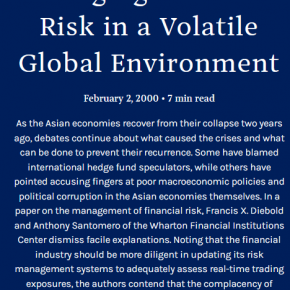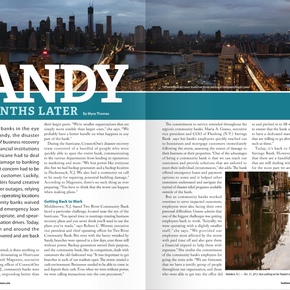Professional Experience
Worked with top consulting firms, global banks, major insurers, fintechs, other technology firms, top universities, governmental agencies, custom publishers, and media organizations to develop compelling content with a strong narrative. Provided companies with superior content that aligned with their vision and goals. Handled thought leadership strategy by determining, researching, and writing content for case studies, white papers, webinars, talking points, presentations, and blog content for consulting organizations, fintechs, financial institutions, private equity firms, insurers, and other corporations. Developed content for leading companies and business schools, including BNP Paribas, EY, Marsh, New York Life, Wells Fargo, University of Pennsylvania’s Wharton School of Business (Knowledge@Wharton), Emory University’s Goizueta Business School, and many others. Worked as a journalist, regularly covering financial services, fintechs, and other technology firms. Expert knowledge in the payments sector.
Expertise
Editor
27 Years
Researcher
28 Years
Writer
28 Years
Specialty
Finance
26 Years
Business (general)
28 Years
Technology
23 Years
Industries
Marketing (in-house) - Fortune 1000 corp. clients
20 Years
Online/new media
28 Years
Magazine - Trade magazines/publications (B2B)
27 Years
Total Media Industry Experience
28 Years
Media Client List (# assignments last 2 yrs)
The Secured Lender Magazine (10+), Thomson Reuters (10+), Careers In Finance Markets (10+), Dice.com (10+), EFinancialCareers.com (10+), Emory Business Magazine (10+), FSO Magazine (10+), JobsInTheMoney.com (10+), Knowledge@Emory (10+), President & CEO Magazine (6-10), Publishers Weekly (6-10), Middle Market Growth Magazine (10+), Strategic Finance Magazine (1-2), BankNews Magazine (1-2), Emory Lawyer Magazine (3-5), ALM (10+)
Corporate Client List (# assignments last 2 yrs)
Media Organizations (10+), Global Banking (10+), Trampsteamer Media (10+), Undisclosed/Top Auditing firms (10+), Undisclosed/Top Finance firms (10+), Fintech (10+), Consulting firms (10+), Private Equity (10+), Tech firms (10+), Asset-based Lenders and Factors (10+), Alternative Finance (10+)
Other Work History
Thought Leadership Senior Strategy Consultant, Wells Fargo, New York, New York (9/22-8/23); Senior Editor, Group SJR (part of WPP), New York, New York (7/21-8/22); Managing Editor, FSO Magazine (Financial Services Outsourcing Magazine), Manalapan, New Jersey (4/07-9/08); Regional Editor, NJ Biz, New Brunswick, NJ (5/97-5/98); Online Editor/Writer, NJ Biz, New Brunswick, NJ (1/97-4/97); Prior Finance/Business Experience: Held the AVP post at an insurance intermediary for Lloyd's of London, serving as their senior underwriter for one of the leading commercial insurers. Analyzed financial statements, including 10-Ks and more. Drafted proposals and worked on contracts to ensure reinsurance treaty renewals.
Technical Skills
Financial Research & Competitive/Industry Analysis
Computer Skills
Word, Excel, Powerpoint
Work Permits & Visas
U.S. citizen
References
References available upon request, including magazine editors & corporate clients
Awards
Fellowship recipient, The Society of Environmental Journalists (2004 and 2005)
Fellowship recipient, National Conference of Editorial Writers (May 2002)
First Place Award for Investigative Journalism, Working Press Association of New Jersey, A Thrift Tug of War, the cover story in the June 16, 1997 issue of BUSINESS NEWS New Jersey (6/98)
First Place Award for a Business & Economic Series, New Jersey Press Association, Compensating Downsized Workers & Towns, in the June 12, 1996 issue of The Suburban newspaper (4/97)
Associations
Society of Environmental Journalists
Society of American Business Editors & Writers








